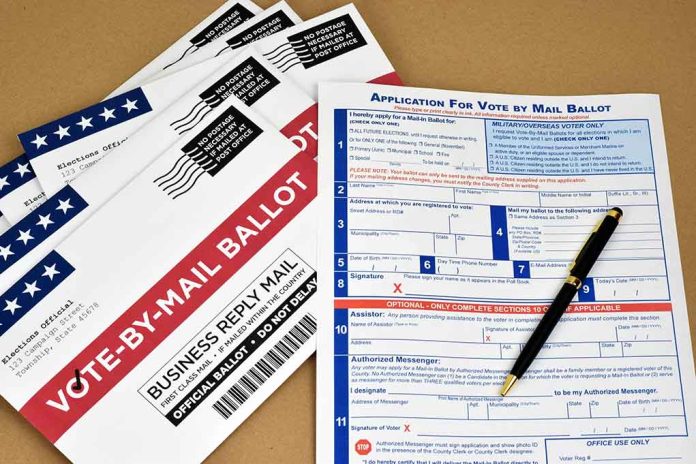
The Pennsylvania Supreme Court has made a landmark ruling, outlawing the consideration of undated mail-in ballots for the 2024 elections, igniting debates over voter integrity and accessibility.
At a Glance
- The Pennsylvania Supreme Court has blocked undated mail-in ballots.
- This decision reverses a previous court ruling.
- Republicans argue the decision upholds existing laws.
- State officials favored counting undated ballots for ease.
- Justice Dougherty criticized changes in election laws mid-process.
Court Blocks Undated Mail-In Ballots
The Pennsylvania Supreme Court has blocked the counting of mail-in ballots lacking a handwritten date in the upcoming 2024 election. This ruling is a result of an appeal by the Pennsylvania GOP, reversing a Commonwealth Court decision which labeled the date requirement unconstitutional. This ruling emphasizes adhering to existing election laws, ensuring the validity of votes. Republicans argue that discarding undated ballots is a return to proper legal frameworks, asserting that these standards should not be altered.
Justice Kevin Dougherty criticized the attempts by the Commonwealth Court to change election laws amidst an ongoing election, affirming the Supreme Court’s commitment to maintaining procedural integrity. The decision is considered a win for the GOP, who have accused Democrats of trying to undermine election protocols by challenging such requirements. State officials previously supported the omission of dates, arguing it would ease the election process for workers managing large volumes of ballots.
NEW: The DNC is urging the Pennsylvania Supreme Court to rule that counties must count undated and misdated mail-in ballots during the Nov. 5 election. A lower court issued a narrow ruling on the matter that only applied to a previous special election. https://t.co/gCH6awSK08
— Democracy Docket (@DemocracyDocket) November 1, 2024
State and Party Reactions
The ruling has divided opinions. Pennsylvania Republicans back the Supreme Court’s ruling, viewing it as an affirmation of keeping the legal structure intact for future elections. In contrast, some state officials argued that maintaining the date requirement imposes unnecessary burdens on election workers. The Pennsylvania Department of State had appealed to ease these burdens by supporting the acceptance of undated ballots.
‘This Court will neither impose nor countenance substantial alterations to existing laws and procedures during the pendency of an ongoing election.’ We said those carefully chosen words only weeks ago. Yet they apparently were not heard in the Commonwealth Court, the very court where the bulk of election litigation unfolds.” remarked Justice Kevin Dougherty.
This decision marks the second recent attempt by the state’s Supreme Court to uphold the date requirement, underscoring an ongoing tug-of-war over what constitutes proper election protocol. The debate centers on the balance between ensuring voting integrity through strict guidelines and promoting voter participation by lessening procedural barriers.
Implications for Voter Engagement
The Pennsylvania Supreme Court’s ruling will likely impact voter turnout and participation in the 2024 elections. By enforcing the requirement for mail-in ballots to bear handwritten dates, some voters might see it as a barrier, potentially affecting turnout. However, proponents of the ruling emphasize the need for reinforced laws to safeguard electoral integrity. The ruling reflects the broader national conversation on voting laws amid heightened concerns over election security and legitimacy.
Pennsylvania’s stance on mail-in ballots could serve as a precedent for how similar cases are handled across the United States. This decision places Pennsylvania at the heart of discussions on balancing strict voting procedures with enabling broader democratic engagement.
Sources:
Pennsylvania Supreme Court Backs GOP In Mail-In Ballot Dispute













